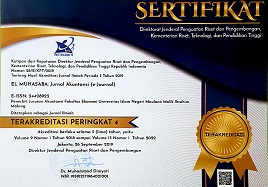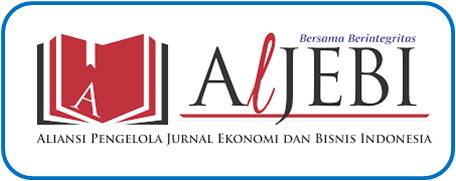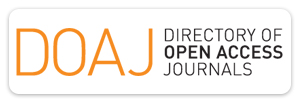INTERNET FINANCIAL REPORTING: MEDIA ANALISIS AKUNTABILITAS PERUSAHAAN FINANCIAL TECHNOLOGY
Abstract
Keywords
Full Text:
PDFReferences
Africa, L. A., & Dewi, M. (2021). Analysis of Internet Financial Reporting on The Financial Statements Of State-Owned Enterprises In Indonesia. IJEBD, 04(02), 134–139.
https://jurnal.narotama.ac.id/index.php/ijebd/article/view/1104, diakses tanggal 05 November 2021
Badan Pengawas Pasar Modal dan Lembaga Keuangan. (2012). Peraturan Nomor X.K.6 tentang Penyampaian Laporan Tahunan Emiten atau Perusahaan Publik
Badan Pengawas Pasar Modal dan Lembaga Keuangan. (2012). Peraturan Nomor IX.I.5 tentang Pembentukan dan Pedoman Pelaksanaan Kerja Komite Audit
Bank Indonesia. (2017). Peraturan Bank Indonesia tentang Penyelenggaraan Teknologi Finansial. (PBI No.19/12/PBI/2017)
Chariri, A. (2009). Landasan filsafat dan metode penelitian kualitatif. Workshop Metodologi Penelitian Kuantitatif dan Kualitatif, Laboratorium Pengembangan Akuntansi (LPA), Fakultas Ekonomi Universitas Diponegoro Semarang, 31 Juli – 1 Agustus 2009. Semarang: Faculty Economics and Business, Diponegoro University
Chatterjee, B., & Hawkes, L. (2008). Does internet reporting improve the accessibility offinancial information in a global world? Acomparative study of New Zealand and Indiancompanies. Australasian Accounting, Business and Finance Journal, 2(4), 33–56. https://doi.org/10.14453/aabfj.v2i4.3
Deegan, C. (2019). An Introduction to Accounting: Accountability in Organisations and Society, 1st Edition. Cangage AU
Elo, S., Kääriäinen, M., Kanste, O., Pölkki, T., Utriainen, K., & Kyngäs, H. (2014). Qualitative Content Analysis: A Focus on Trustworthiness. SAGE Open, 4(1), 2158244014522633. https://doi.org/10.1177/2158244014522633
Ekasari, K., Eltivia, N., & Soedarso, E. H. (2019). Analisis Konten terhadap Pengungkapan Etika dan Integritas pada Sustainability Reporting. Journal of Research and Application: Accounting and Management, 4(1). https://doi.org/10.18382/jraam.v4i1.008
Haron, H. (2006). Audit Committee and Corporate Governance. Business Ethics. Audit Committee, and Business in Conducting Good Corporate Governance. Universitas Bina Nusantara
Hwang, T. K., Li, Y. M., & Wan, J. F. (2018). A social recommendation mechanism for peer-to-peer lending. In Americas Conference on Information Systems 2018: Digital Disruption, AMCIS 2018. Association for Information Systems.
Khan, M.N.A.A., Ismail, N.A. (2010). A STUDY ON THE INDEX OF INTERNET FINANCIAL REPORTING. International Postgraduate Business Journal. 2. 1-23
Lee, M. R., Yen, D. C., & Hurlburt, G. F. (2018). Financial Technologies and Applications. IT Professional. IEEE Computer Society. https://doi.org/10.1109/MITP.2018.021921648
Marginingsih, R. (2021). Financial Technology (Fintech) Dalam Inklusi Keuangan Nasional di Masa Pandemi Covid-19. Moneter - Jurnal Akuntansi Dan Keuangan, 8(1), 56–64. https://doi.org/10.31294/moneter.v8i1.9903
Moro-Visconti, R., Rambaud, S. C., & Pascual, J. L. (2020). Sustainability in FinTechs: An explanation through business model scalability and market valuation. Sustainability (Switzerland), 12(24), 1–24. https://doi.org/10.3390/su122410316
Otoritas Jasa Keuangan. (2016). Peraturan Otoritas Jasa Keuangan tentang Layanan Pinjam Meminjam Uang Berbasis Teknologi Informasi. (POJK No.77/POJK.01/ 2016
Otoritas Jasa Keuangan. (2021). Statistik Fintech Lending Periode September 2021. https://www.ojk.go.id/id/kanal/iknb/data-dan-statistik/fintech/Pages/Statistik-Fintech-Lending-Periode-September-2021.aspx, diakses tanggal 27 November 2021
Purba, L., Medyawati, H., Silfianti, W., & Hermana, B. (2013). Internet Financial Reporting Index Analysis: An Overview from the State Owned Enterprises in Indonesia. Journal of Economics, Business and Management. https://doi.org/10.7763/joebm.2013.v1.61
Rahim, W. M., & Martani, D. (2015). Analisis Pengaruh Tingkat Akses Internet, Kompetisi Politik, Opini Audit, Karakteristik PEMDA, dan Karakteristik Demografi Terhadap Pengungkapan Informasi Keuangan dan Non-Keuangan Website Pemerintah Daerah. Prosiding Simposium Nasional Akuntansi XIX.
Rahmi, M. (2019). Fintech for Financial Inclusion: Indonesia case. Atlantis Press. https://doi.org/10.2991/icebef-18.2019.168
Reskino, R., & Sinaga, N. N. J. (2017). KAJIAN EMPIRIS INTERNET FINANCIAL REPORTING DAN PRAKTEK PENGUNGKAPAN. Media Riset Akuntansi, Auditing Dan Informasi, 16(2), 161. https://doi.org/10.25105/mraai.v16i2.1643
Rini, R. (2016). Penerapan Internet Financial Reporting untuk Meningkatkan Akuntabilitas Organisasi Pengelola Zakat. Jurnal Akuntansi Multiparadigma. https://doi.org/10.18202/jamal.2016.08.7022
Rizqiah, R. N., & Lubis, A. T. (2019). Penerapan Internet Financial Reporting (IFR) Pada Bank Umum Syariah Di Indonesia. JURNAL AKUNTANSI DAN KEUANGAN ISLAM, 5(1), 63–81. https://doi.org/10.35836/jakis.v5i1.14
Sayidah, N., Hayati, N., & Handayani, A. E. (2016). Corporate Governance dan Internet Financial Reporting. Jurnal Akuntansi Multiparadigma. https://doi.org/10.18202/jamal.2016.12.7034
Surifah, S. (2013). ARRANGING THE INDEX OF CORPORATE GOVERNANCE. Jurnal Dinamika Manajemen, 2(1). https://doi.org/10.15294/jdm.v2i1.2483
Suryono, R. R., Budi, I., & Purwandari, B. (2020). Challenges and trends of financial technology (Fintech): A systematic literature review. Information (Switzerland). MDPI AG. https://doi.org/10.3390/info11120590
Suryono, R. R., Purwandari, B., & Budi, I. (2019). Peer to peer (P2P) lending problems and potential solutions: A systematic literature review. In Procedia Computer Science (Vol. 161, pp. 204–214). Elsevier B.V. https://doi.org/10.1016/j.procs.2019.11.116
United Nations. (2007). Guidance on good practices in corporate governance disclosure. (pp. 61–87). https://doi.org/10.18356/409eafb3-en
Yan, J., Yu, W., & Zhao, J. L. (2015). How signaling and search costs affect information asymmetry in P2P lending: the economics of big data. Financial Innovation, 1(1). https://doi.org/10.1186/s40854-015-0018-1
Zhang, S., Xiong, W., Ni, W., & Li, X. (2015). Value of big data to finance: observations on an internet credit Service Company in China. Financial Innovation, 1(1). https://doi.org/10.1186/s40854-015-0017-2
DOI: https://doi.org/10.18860/em.v13i2.14183
Refbacks
- There are currently no refbacks.
Editorial Office:
Megawati Soekarnoputri Building
Accounting Department, Faculty of Economics
Jln. Gajayana 50 Telp (0341) 558881
E-mail: elmuhasaba@uin-malang.ac.id
Universitas Islam Negeri Maulana Malik Ibrahim Malang
E-ISSN 2442-8922
P-ISSN 2086-1249

This work is licensed under a CC BY SA 4.0 International License

















